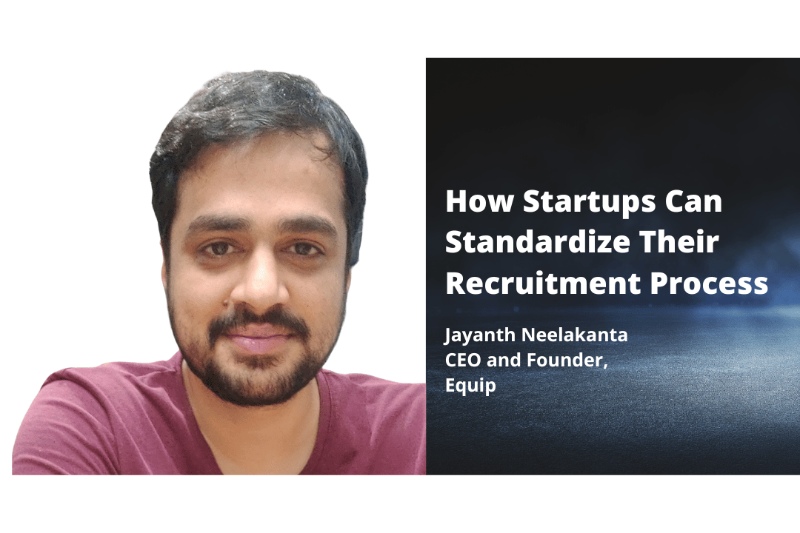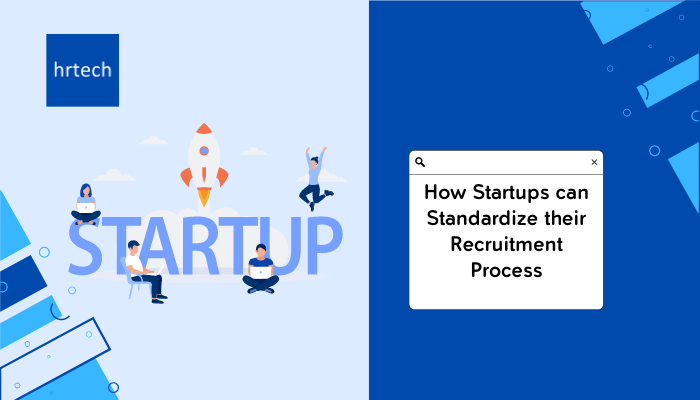By definition, a startup is designed to grow fast. Also, every successful startup founder swears that having a stellar team was critical to their success. So, the corollary is: if your startup has to succeed, you must hire a stellar team quickly.
by Jayanth Neelakanta, CEO and Founder, Equip

This is more difficult than you’d think, because founders and early hires are typically people from Tech, Sales or Product backgrounds. They don’t possess any HR experience. So, startup founders not only have to do a stellar job at hiring quickly, they also have to do with no prior experience! (Unless they have been a founder earlier, of course).
Standardizing the Process
Standardizing the recruitment process helps overcome this challenge. Standardizing has two major benefits: (i) Helps you avoid 80% of the common mistakes founders make; (ii) Makes the future hiring process much easier.
Early-stage teams are probably reluctant to standardize hiring because they feel their product is exceptional and a “process” won’t help in discovering the right talent. They would rather attend events, interview everyone one-on-one and reach out to candidates on their own.
While this approach might work until your team size reaches around 10, continuing this beyond that would mean spending most of your time in hiring. Also, no matter how innovative your idea may seem to you, its implementation and distribution will require fairly well-known skills. So, whatever has worked for thousands of other companies should work for you too!
Some Standardization Tips
Here are a few Standardization Practices that I would recommend:
1. Identify multiple job boards and post on them
Most founders post on only a few job boards. Once you have created a job description, advertising on multiple boards doesn’t require a lot of extra effort. But, the ROI is huge. Posting on multiple job boards essentially triples your chances of acquiring a good candidate. I have hired some of the best people from some lesser-known job boards like Hasjob. As part of your process, decide on a set of job boards you always post to and, maybe a couple more depending on the role.
2. Identify standardized skill tests for which you can automate assessments
Most recruiters’ first step is getting on call with a candidate and judging them based on responses to very role-specific questions. Take a step back and see if there are testable skills that correlate with the role. Maybe you are hiring a data entry operator. Instead of getting on call with them and giving them a task, can simply send them a link to a typing test and see how they perform? You could then look at benchmarks and judge how well they have done. Not having a standard test makes it difficult for you to be objective about the candidate.
3. Automate async assessments for large top-of-the-funnel applicant numbers:
If you don’t have enough bandwidth to deal with a large applicant number, consider using tools like Equip that create shareable and proctored assessments. You can then engage with only the top-performing candidates. Also, if you are hiring for the same role later, you can easily re-use the assessment.
4. Design a hiring schedule for the ‘job post to offer letter’ journey:
Even though startups are chaotic, it would be useful to have a schedule and inform the candidate about when the next step will get triggered. Saying something like, “You should know if you have made it to the next stage in the next 10 days” and sticking to it is good discipline. It will also help you close your positions sooner. Remember, you want to move fast and not be stuck with an open position for months!
Method inside the Madness
I have founded multiple startups and have been guilty of not following a process for roles. Though in the short-term, you may feel like you have saved time, it will definitely come back and bite you later. Also, as your team grows, you would like to delegate at least some parts of the hiring. If there isn’t a standardized process in place , your colleague won’t know what to do!
Most startups start as 2-3 member teams, with virtually no structure. That is how it must be, because discovering PMF requires not much of a structure. However, as startups grow, they buy a domain, move to a paid version of Slack, invest in a CRM tool, etc. All well and good. But, recruitment remains one of the last functions to be accorded with some process. The earlier this is addressed, the more quickly and efficiently you hire. The more quickly and efficiently you hire, the better you grow.
About the author :

Jayanth is the CEO at Equip. He has a PhD in Theoretical Physics from Syracuse University and is also a full-stack developer. He is passionate about eLearning and online assessments. He built AutoProctor, a tool to prevent cheating on online tests, which got into Y Combinator. Over 15 million tests have been conducted on AutoProctor. As many recruiters were using AutoProctor, Equip was launched to help recruiters filter candidates via online tests. Jayanth believes that in the remote-first world, candidates will increasingly be selected for skills, and not pedigree. He firmly believes that tools like Equip will make this selection easier for recruiters as well as candidates.





